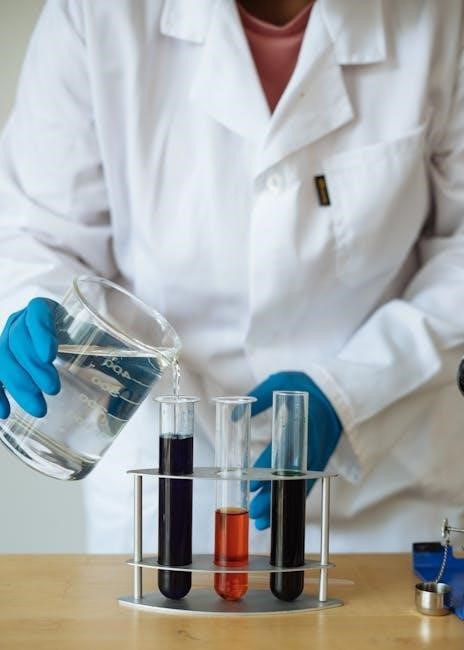Welcome to your comprehensive chemistry final exam study guide! This resource is designed to help you master key concepts‚ practice problem-solving‚ and develop effective study strategies to ensure success on your exam.
1.1 Importance of Preparing for the Chemistry Final Exam
Preparing for the chemistry final exam is crucial to ensure a strong understanding of key concepts and problem-solving skills. A well-structured study plan helps build confidence and mastery over topics like atomic structure‚ chemical reactions‚ and stoichiometry. Regular review of notes‚ flashcards‚ and practice problems enhances retention and conceptual clarity; By understanding the “why” behind each concept‚ students can approach problems more effectively‚ leading to better performance and long-term knowledge retention.
1.2 Overview of Key Concepts and Topics Covered
This study guide covers essential chemistry topics‚ including atomic structure‚ chemical reactions‚ and stoichiometry. It also explores gas laws‚ thermodynamics‚ and molecular structure. Key areas like chemical bonding‚ solutions‚ and acids/bases are emphasized. Practical skills such as balancing equations and performing concentration calculations are included. The guide ensures a thorough understanding of fundamental principles and their applications‚ providing a solid foundation for success on the final exam.

Understanding Key Chemistry Concepts
This section explores foundational chemistry concepts‚ including atomic structure‚ chemical reactions‚ stoichiometry‚ gas laws‚ and thermodynamics‚ explaining molecular interactions and key chemical processes.
2.1 Atomic Structure and the Periodic Table
Atomic structure forms the foundation of chemistry‚ focusing on protons‚ neutrons‚ and electrons. Understanding electron configuration‚ orbitals‚ and valence electrons is crucial. The periodic table organizes elements by atomic number‚ revealing patterns in properties. Periodic trends‚ such as atomic radius and electronegativity‚ explain how elements behave; Memorizing key elements and their positions aids in predicting chemical interactions. Mastery of these concepts is essential for analyzing molecular structures and chemical reactions‚ making it a cornerstone of chemistry mastery and exam success.
2.2 Chemical Reactions and Stoichiometry
Chemical reactions involve the transformation of substances‚ governed by stoichiometry‚ which quantifies reactants and products. Balancing equations is fundamental‚ ensuring mass conservation. Mole ratios‚ molar masses‚ and limiting reagents are critical for calculations. Understanding reaction types‚ such as synthesis and decomposition‚ aids in predicting outcomes. Mastery of stoichiometric principles is essential for calculating concentrations‚ theoretical yields‚ and percent yield‚ all vital for solving problems in chemistry and excelling on the final exam.
2.3 Gas Laws and Thermodynamics
Gas laws‚ such as Boyle’s and Charles’s laws‚ describe the behavior of gases under varying conditions of pressure‚ volume‚ and temperature. Understanding these principles is crucial for solving problems involving gas mixtures and reactions. Thermodynamics introduces concepts like internal energy‚ enthalpy‚ and entropy‚ which govern energy transformations. Mastering these topics enables students to analyze real-world phenomena‚ such as engine efficiency and chemical reactions‚ and apply mathematical relationships to predict system behavior‚ essential for advanced chemistry problem-solving.

Effective Study Strategies
Mastering chemistry requires more than just knowledge; it demands strategic studying. This section shares proven techniques to organize your study time‚ retain information‚ and excel on exam day.
3.1 Creating a Detailed Study Schedule
A well-structured study schedule is essential for effective preparation. Allocate specific time slots for each topic‚ ensuring balanced coverage of atomic structure‚ chemical reactions‚ and gas laws. Prioritize weak areas and include regular breaks to maintain focus. Use calendars or planners to track progress and set achievable milestones. Consistency is key—stick to your plan to build confidence and mastery of chemistry concepts before the final exam;

3.2 Using Flashcards for Memorization
Flashcards are an excellent tool for memorizing key chemistry terms and concepts. Create cards with terms on one side and definitions or explanations on the other. Regularly review them‚ focusing on weak areas. Use different colors or highlighters to enhance visual memory. Digital flashcard apps like Quizlet offer convenience and accessibility. This method helps reinforce retention of periodic table elements‚ chemical formulas‚ and reaction types‚ making complex information easier to recall during exam preparation.
3.3 Practicing with Sample Problems and Past Exams
Practicing with sample problems and past exams is crucial for exam success. These resources help familiarize you with question formats and difficulty levels. Start with problems covering a range of topics to identify strengths and weaknesses. Review detailed solutions to understand mistakes and improve problem-solving techniques. Regularly completing timed practice exams builds time management skills and reduces exam anxiety. This hands-on approach ensures you’re well-prepared for the actual exam.
Key Topics to Review
Focus on atomic structure‚ chemical bonding‚ reactions‚ and gas laws. Master stoichiometry‚ thermodynamics‚ and molecular interactions. Review acids‚ bases‚ pH calculations‚ and concentration principles for a solid foundation.
4.1 Chemical Bonding and Molecular Structure
Understand the fundamentals of chemical bonding‚ including ionic‚ covalent‚ and metallic bonds. Learn how electrons are shared or transferred to form compounds. Study molecular geometry‚ polarity‚ and the VSEPR theory to predict shapes. Review intermolecular forces like hydrogen bonding and van der Waals forces‚ which influence physical properties. Practice identifying Lewis structures and resonance forms. This knowledge is crucial for understanding chemical behavior and reactions.
4.2 Solutions and Concentration Calculations
Master the concepts of solutions‚ solubility‚ and concentration calculations. Learn to differentiate between solutes‚ solvents‚ and solubility. Practice calculating molarity‚ molality‚ and percent composition. Understand how to prepare solutions using dilution and concentration methods. Review stoichiometry involving solutions‚ such as solution reactions and titrations. Apply these skills to real-world scenarios‚ ensuring accuracy in laboratory calculations. Focus on common pitfalls and verify your understanding through practice problems to solidify your grasp of solution chemistry.
4.3 Acids‚ Bases‚ and pH Calculations
Understand the fundamental properties of acids and bases‚ including their definitions and behavior in aqueous solutions. Master the pH scale‚ calculating pH and pOH for strong and weak acids/base solutions. Practice determining ion concentrations using Ka and Kb values. Review neutralization reactions and buffers. Ensure accuracy in solving problems involving pH‚ concentration‚ and equilibrium. Focus on common mistakes‚ such as misapplying formulas‚ to strengthen your understanding and problem-solving skills in acid-base chemistry.
Practice Problems and Conceptual Understanding
Engage with practice problems to reinforce key concepts and develop problem-solving skills. Solve stoichiometry‚ gas laws‚ and equilibrium problems to apply theoretical knowledge to real-world scenarios effectively.
5.1 Solving Stoichiometry Problems
Mastering stoichiometry involves balancing chemical equations and applying mole concepts to solve quantitative problems. Start by identifying the given‚ unknown‚ and overall reaction. Use conversion factors to relate moles of reactants and products. Practice calculating limiting reagents‚ theoretical yields‚ and percent yields. Regularly solving sample problems enhances problem-solving skills and reinforces conceptual understanding. Focus on understanding the “why” behind each step to apply principles to diverse scenarios effectively.
5.2 Applying Gas Laws to Real-World Scenarios
Gas laws‚ such as Boyle’s and Charles’s‚ are fundamental for understanding real-world phenomena like tire inflation‚ scuba diving‚ and respiratory systems; Practice problems involving pressure‚ volume‚ and temperature relationships help solidify these concepts. The ideal gas law is particularly useful in industrial applications‚ such as calculating gas quantities in chemical plants. By connecting theoretical principles to practical examples‚ students can better grasp how gas laws influence everyday situations and solve complex problems effectively.

5.3 Balancing Chemical Equations
Mastering the skill of balancing chemical equations is essential for understanding chemical reactions. Start by identifying the number of atoms for each element on both sides. Use coefficients to balance atoms systematically‚ beginning with elements that appear only once. For polyatomic ions‚ treat them as single units. Ensure the charge and mass are conserved. Practice with various reaction types‚ such as synthesis‚ decomposition‚ and combustion. Regular practice helps build confidence and fluency in balancing complex equations accurately.
Exam Preparation Tips
Plan study sessions‚ practice problems‚ and attend review sessions. Stay organized‚ ensure adequate rest‚ and maintain a positive mindset to approach the exam confidently.
6.1 Time Management During the Exam
Effective time management is crucial for success in your chemistry final exam. Allocate a specific duration to each question based on its difficulty and point value. Start by skimming through the entire exam to identify easier questions and tackle them first. This approach ensures you secure points quickly and leaves time for more challenging problems. Remember to budget a few minutes at the end to review your answers and make necessary corrections. Stay calm and systematic to maximize your performance.
6.2 Strategies for Tackling Different Question Types
Mastering different question types is essential for exam success. For multiple-choice questions‚ eliminate incorrect options first to increase your chances of selecting the right answer. With calculation problems‚ always show your work and check unit consistency. For essay questions‚ outline your answer before writing to ensure clarity and completeness. Skim the exam first to identify easier questions and tackle them early‚ allowing more time for challenging ones. This strategic approach helps maximize your score and reduces exam stress.
6.3 Reviewing and Understanding Common Mistakes
Identifying and learning from common mistakes is crucial for improving your chemistry exam performance. Pay attention to recurring errors‚ such as stoichiometry miscalculations or misapplying gas laws. Review practice tests to pinpoint weak areas and understand the root causes of mistakes. Focus on understanding the “why” behind incorrect answers to avoid repeating them. Regular self-assessment and revisiting challenging topics will help you refine your problem-solving skills and build confidence for the final exam.

Additional Resources for Final Exam Preparation
Supplement your studies with recommended textbooks‚ online materials‚ and interactive tools. Join study groups and attend review sessions to enhance your understanding and retention of key chemistry concepts.
7.1 Recommended Textbooks and Online Materials
Enhance your preparation with textbooks like Chemistry: The Central Science and Chemistry: An Atoms First Approach‚ which provide in-depth explanations and practice problems. Online platforms such as MasteringChemistry offer interactive exercises and personalized study plans. Additionally‚ utilize free resources like Khan Academy and Crash Course Chemistry for video tutorials and concept reviews. These materials complement your study guide‚ ensuring a well-rounded understanding of chemistry concepts and problem-solving skills.
7.2 Utilizing Study Groups and Peer Teaching
Study groups and peer teaching are powerful tools for exam preparation. Collaborating with classmates allows for interactive learning‚ where complex concepts can be discussed and clarified. Explaining ideas to others reinforces your own understanding‚ while hearing different perspectives broadens your knowledge. Actively participating in group discussions and teaching peers can help identify gaps in your understanding. This collaborative approach fosters a supportive environment and enhances retention of key chemistry concepts‚ making it easier to tackle challenging exam questions with confidence.
7.3 Taking Advantage of Review Sessions
Review sessions are an invaluable resource for exam preparation. They provide an opportunity to clarify doubts‚ revisit challenging topics‚ and practice problem-solving under guidance. Attending these sessions allows direct interaction with instructors‚ ensuring a deeper understanding of key concepts. Many review sessions include practice questions and past papers‚ helping you gauge your readiness. Regular attendance can also reduce exam anxiety and improve time management skills‚ making you more confident and prepared for the final exam.

Final Review and Assessment
Conduct a thorough self-assessment to identify knowledge gaps. Use practice tests to evaluate your understanding and adjust your study plan accordingly. Ensure readiness for the exam.
8.1 Conducting a Self-Assessment of Knowledge Gaps

Self-assessment is crucial for identifying areas needing improvement. Review your notes and practice problems to pinpoint weaknesses. Use flashcards to test recall of key terms and concepts. Take practice tests to evaluate problem-solving skills and understanding. Focus on topics where you struggle the most‚ such as stoichiometry or thermodynamics. By addressing these gaps‚ you can build a strong foundation and approach the exam with confidence.

8.2 Using Practice Tests for Self-Evaluation
Practice tests are an essential tool for self-evaluation‚ allowing you to assess your understanding and problem-solving skills under exam-like conditions. Regularly taking practice tests helps identify areas where you need improvement and builds confidence. Reviewing mistakes and understanding the reasoning behind correct answers strengthens conceptual knowledge. Focus on topics like stoichiometry‚ gas laws‚ and chemical reactions to ensure comprehensive preparation for the final exam.
8.3 Adjusting Study Plans Based on Weak Areas
Identify your weak areas through practice tests and self-assessment. Adjust your study plan to focus more on these topics‚ such as stoichiometry or gas laws. Allocate extra time to review challenging concepts and solve additional problems. Use flashcards or study groups to reinforce understanding. Track your progress and refine your strategy to address gaps effectively‚ ensuring a well-rounded preparation for the exam.
